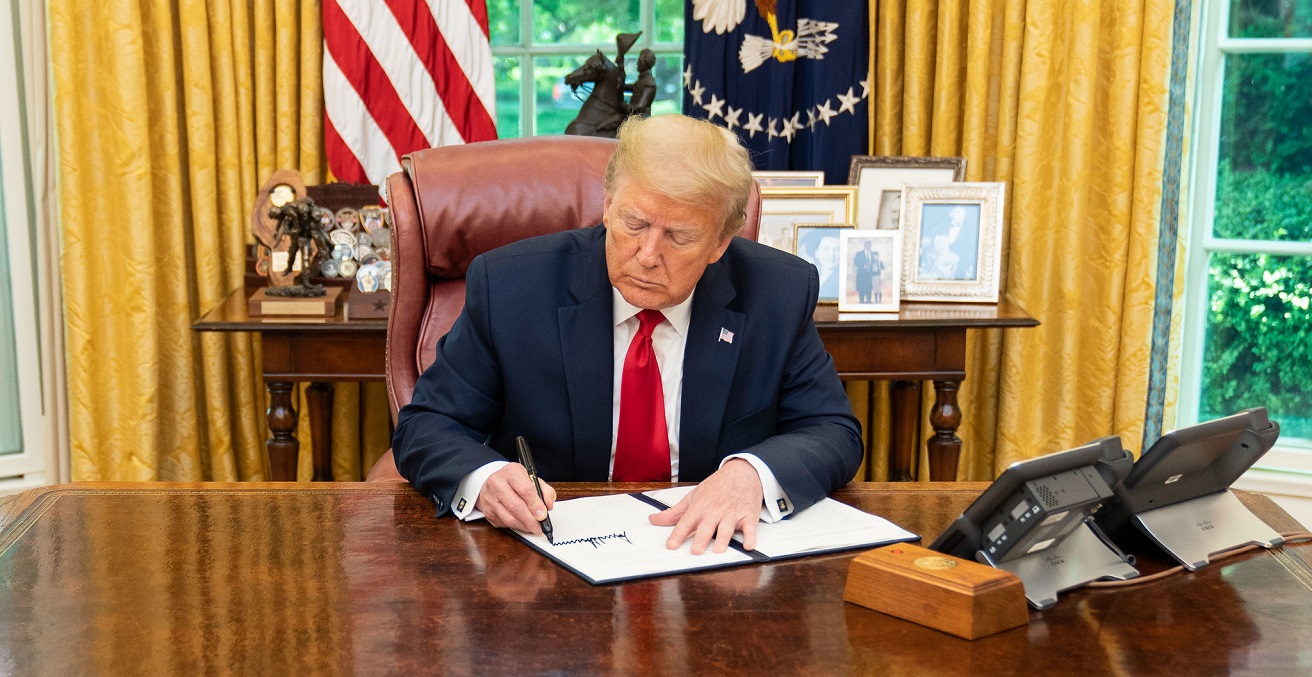The United States at War with the International Criminal Court (Again)

Last week, President Donald Trump issued an executive order authorising sanctions against ICC staff investigating American troops and intelligence officials and those of allied nations, including Israel, for possible war crimes in Afghanistan and elsewhere. The executive order is the latest in the US’s long-running battle with the court.
The United States’ relationship with the ICC has oscillated from qualified support from Bill Clinton, outward hostility and pragmatic cooperation from George W. Bush, tepid support from Barack Obama, and a return to outward hostility from the Trump administration. While Trump’s executive order echoes many of the reservations held by previous administrations, the threat of sanctions against individuals, possibly including US citizens, represents a retreat from formally long-espoused views about the rule of law and international justice.
The US and the ICC – a brief history
The US’s relationship with the ICC is historically fraught. Despite initial support for the creation of a permanent international criminal court, it is well known that the US was one of seven countries to vote against adopting the Rome Statute as the founding document for the ICC. Nonetheless, President Clinton signed the Rome Statute, making a point that the United States was reaffirming its “strong support for international accountability and for bringing to justice perpetrators of genocide, war crimes, and crimes against humanity.”
The Bush administration then unsigned the Rome Statute, Under Secretary of State John Bolton informing the UN that the US now had “no legal obligations arising from its signature on 31 December 2000.” The Bush administration’s opposition to the ICC was reinforced through legislation. The American Servicemembers’ Protection Act (ASPA) prohibited almost all US support for and cooperation with the ICC and, most controversially, allowed the US President to use “all means necessary and appropriate” to free Americans “being detained or imprisoned by, on behalf of, or at the request of the International Criminal Court.” The ASPA is thus often referred to as The Hague Invasion Act. Simultaneously, the US undertook an aggressive campaign of bilateral immunity agreements (BIAs) which committed signatories to the Rome Statute not to turn over American citizens to the Court. In a number of cases, the US linked the provision of military aid on the condition of signing a BIA.
The Obama administration’s dealings with the Court, while not as openly hostile as they were in the early years of the Bush administration, were nonetheless characterised by little more “than a selective love for the ICC.”
There was forewarning of Trump’s Executive Order in 2018 prompted by concerns that the Pre-Trial Chamber might be about to authorise opening a situation in Afghanistan that would include investigating CIA operatives allegedly torturing suspected Taliban operatives in “black sites” in Lithuania, Poland, and Romania. Bolton, now as Trump’s national security advisor, announced that “if the court comes after us, Israel or other US allies, we will not sit quietly […] We will ban [ICC] judges and prosecutors from entering the United States. We will sanction their funds in the US financial system, and we will prosecute them in the US criminal system.” Echoing earlier objections to the ICC, Bolton argued that “this president will not allow American citizens to be prosecuted by foreign bureaucrats, and he will not allow other nations to dictate our means of self-defence.”
One of the loudest criticisms of the court has been its focus on Africa, and in turn, its inability or lack of willingness to investigate crimes that fall under its jurisdiction committed by “great powers.” In 2019, when the Pre-Trial Chamber rejected the request of the prosecutor to proceed with an investigation for alleged crimes against humanity and war crimes on the territory of Afghanistan, there was a fear that the US’s bullying tactics would (a) reduce the court to a side-show, only able to function when material interests of great powers were not threatened, and (b) allow powerful states to act with impunity. Thus, the decision by the Appeals Chamber in March 2020, to allow the prosecutor to commence an investigation reinvigorated some lost faith in the court, but simultaneously infuriated the Trump administration. While the executive order is underpinned by US legal exceptionalism, it nonetheless highlights some deep misunderstandings about the legal and political reach of the ICC.
First, the executive order argues that the court’s investigation represents an “unusual and extraordinary threat to the national security and foreign policy of the United States.” As Jennifer Trahan and Megan Fairlie point out, such an argument fails to understand that the Court is severely restrained by its reliance on state cooperation, especially with regard to arrest warrants. Furthermore, it is difficult to maintain that the Court represents a threat to national security, while simultaneously describing it as a “failed institution.”
Second, again highlighted by Trahan and Fairlie, the aggressive posturing by the Trump administration fails to appreciate that much of the ICC’s work aligns with stated US interests, including the recent surrender to the court by Ali Kushayb, indicted on charges of crimes against humanity and war crimes committed in Darfur, a situation referred to the court by a United Nations Security Council resolution strongly supported by the Bush Administration).
Third, what is often overlooked in analysis of the US’s relationship with the Court is that the US, by initiating its own legal proceedings into the conduct of US service personal, could avoid scrutiny from the ICC. The ICC is a “court of last resort,” and cases are inadmissible where “the case is being investigated or prosecuted by a State which has jurisdiction over it, unless the State is unwilling or unable genuinely to carry out the investigation or prosecution.”
Australia-US Alliance
The executive order also creates challenges for the Australian government. The 2017 “Foreign Policy White Paper” recommitted Australia to strengthening the rules-based international order, of which the ICC is an important platform. Yet at the time of writing, Australia, a state party to the Rome Statute, had yet to issue a statement of support for the ICC. This comes on the back of Australian advice to the court, having been lobbied by Israel, that the ICC should not investigate alleged crimes committed in Palestine. Both of these decisions reflect badly on Australia’s commitment to the international rules-based order, especially if they are at the behest of ill-informed US foreign policy.
So what?
The US hypocrisy with regard to international criminal justice is not only galling, but it is also ultimately counterproductive. In this current environment, it is important to remember the pivotal role the US played in the establishment of the International Military Tribunal at Nuremberg and the International Criminal Tribunal for the Former Yugoslavia, institutions that did much to establish new legal and political norms to overcome impunity for violations of the gravest of crimes. But these institutions also served broader US interests. The US’s most recent belligerent confrontation with the ICC does little more than further undermine its claim as a protector of the rule of law and promoter of international justice, while also potentially damaging important and established alliances.
Dr Matt Killingsworth is Head of Politics and International Relations and a Senior Lecturer in International Relations at the University of Tasmania. He co-editor of Violence and the State (Manchester University Press, 2015) and the forthcoming Civility, Barbarism and the Evolution of International Humanitarian Law: Who Do the Laws of War Protect? (Cambridge University Press). His current research focuses on the evolution of the modern laws of war, and the International Criminal Court. He is the Chair of the Tasmanian Red Cross International Humanitarian Law Committee and a regular contributor to local and national media. Twitter: @mevanworth
This article is published under a Creative Commons License and may be republished with attribution.





